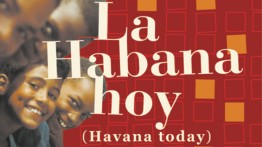"Havana Today" Screening
Thursday, March 28, 2019, 6:30 - 8:30pm

Havana Today: Impressions of a City in 16 Chapters, a film co-directed by Cecilia Ricciarelli and Diego Malquori, is narrated in sixteen fragments, or variations, that together make up a whole. Some of the fragments are stories about the fantasy and imagination of a life divided between revolutionary struggle and survival. Others are interviews with artists, intellectuals or passers-by, which reveal their relationship with this city. Others are composed of collages of images that speak for themselves. The film was inspired by a film project imagined in the ‘60s by Cesare Zavattini and was an official selection at 23 Festival del Nuevo Cine Latinoamericano, La Habana, 24ème Cinéma du Réel, Paris, and 2 Festival Docúpolis, Barcelona.
Following the screening, Malquori is joined by Pablo Massip, who served as director of photography on Havana Today, and historian Michelle Chase to discuss the film and the current situation in Cuba.
Michelle Chase is an historian of modern Latin America, specialized in the Cuban Revolution. She is an Assistant Professor at the Dyson College of Arts and Sciences at Pace University.
Pablo Massip is a Cuban filmmaker. He has worked as a director of photography for several Cuban feature films and has directed documentary films, including They Call Me Cuba (2014), which was presented at the 31st Chicago Latino Film Festival. He was also awarded at the 8th International Festival of Political Films (FICiP) in Buenos Aires, Argentina.
Diego Malquori is an Assistant Professor of Philosophy at the Faculty of Humanities and Social Sciences at The Cooper Union. In addition to his scholarly writing, he has written and directed four documentary films on historical, sociological, and political themes, presented in numerous international film festivals.
Located in the Frederick P. Rose Auditorium, at 41 Cooper Square (on Third Avenue between 6th and 7th Streets)




